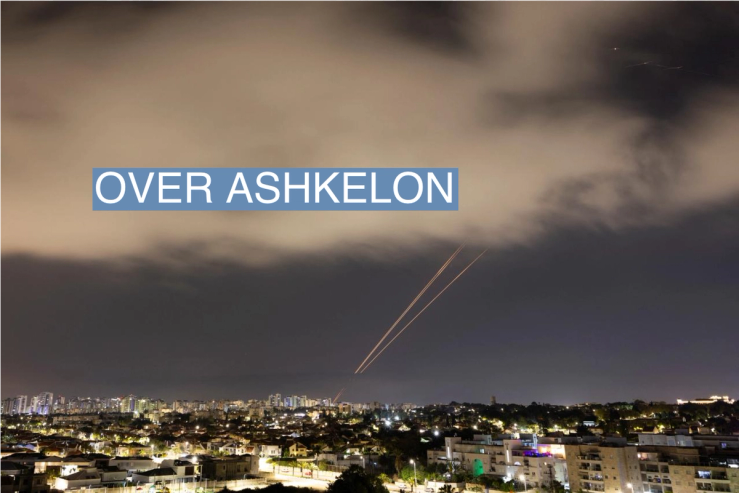The News
Iran’s weekend aerial attack on Israel was designed to cause mass casualties and infrastructure damage, senior U.S. officials said, an assessment that complicates deliberations on how to respond to Tehran and its military allies in the coming weeks.
The Biden administration on Sunday hailed a unified defense of Israel that included U.S., U.K. and French air power and allied Arab states, such as Jordan. Their anti-drone and anti-missile capabilities, combined with Israel’s Iron Dome air defense system, shot down 99% of the more than 300 munitions Tehran and its proxies fired into the Jewish state from Iran, Iraq, Syria and Yemen on Saturday.
Senior U.S. officials said neutralizing the assault was a strategic victory for Israel and its partners, and opens a window to de-escalate tensions in a Middle East region already on edge from Israel’s six-month war in the Gaza Strip. Iran’s operation came in response to Israel’s April 1 attack on an Iranian diplomatic mission in Damascus that killed two Iranian generals.
“With the support of a number of partners, including the U.K. and France, the United States enabled Israel to spectacularly defeat this unprecedented attack,” a senior White House official said on Sunday. “[The Iranians] were clearly intending to destroy and to cause casualties. That was their intent.”
Iranian diplomats and military officials said on Saturday that they weren’t seeking to launch new strikes, provided there were no Israeli reprisals. “The matter can be deemed concluded,” Tehran’s United Nations mission said in a statement.
But Israeli government officials said that Tehran had crossed a clear red line by attacking Israel directly from Iranian soil for the first time in history. They also said the nature of the targets — believed to be major civilian areas and military infrastructure —required a response if their country is to restore deterrence against Iran and its regional allies.
A spokesman for Prime Minister Benjamin Netanyahu said on Saturday that Israel’s response would be “clear and firm.” U.S. officials said President Joe Biden told Netanyahu in a call on Sunday that the Pentagon wouldn’t participate in any Israeli reprisal.
In this article:
Jay’s view
Iran’s attack brought into plain sight a conflict with Israel that’s played out largely in the shadows in recent decades. But as Tehran’s military reach and capabilities grow — including the near mastering of nuclear weapons technologies — Israeli military planners are debating whether any further delay in confronting Tehran directly will come at Israel’s peril.
For much of the past two decades, Israel, sometimes grudgingly, supported American efforts to address the Iranian threat through diplomacy and economic sanctions. This approach has inflicted massive damage to the Iranian economy. And the Obama administration forged a 2015 deal with Tehran to limit its nuclear capabilities. But these caps Iran agreed to were only temporary, and the Trump administration pulled U.S. support for the deal three years later.
During this time, Israel has watched Iran vastly grow its network of military proxies and partners — called the Axis of Resistance — to virtually encircle the Mediterranean country. The power of these armies has become brutally clear in the six months since the Palestinian military group Hamas, with Iranian money and arms, invaded southern Israel and killed 1,200 people. Iranian allies in Yemen, Lebanon, Iraq and Syria have sprung to life to back Hamas, often through strikes on Israeli and American targets. U.S. defense officials said these militias also took part in Saturday’s attack.
The sophistication of the Iranian axis’ weapons and tactics have also vastly improved. Saturday’s attack included ballistic and cruise missiles, as well as one-way attack drones that Iran has mastered building in recent years, and exported to allies globally. Iran and its most powerful regional ally — the Lebanese militia, Hezbollah — have also grown battle-hardened backing Syrian President Bashar al Assad in his war against internal opponents.
Current and former Israeli officials said this weekend that the prospect of a future Iranian attack using nuclear or chemical weapons-tipped missiles and drones shows the threat Tehran poses to their country’s long-term future. So while a counter strike might not happen this month, it will come at some point, they said.
“Now is the time to retaliate towards Iran, but to do it in a smart way,” retired Lieutenant Colonel Jonathan Conricus, a former spokesman for the Israel Defense Forces, told reporters Sunday. “And to do it with the end state [in mind].”
Room for Disagreement
Biden administration officials on Sunday said they weren’t telling Israel not to attack Iran, but stressed that U.S. forces wouldn’t be involved. They also said that Washington isn’t seeking a broader conflict with Iran and that their focus is on ending the war in Gaza.
“Our goal remains to de-escalate immediately and halt any further attacks. We do not seek conflict with Iran,” said the senior White House official. He suggested that new economic sanctions could be enacted against Iran as a result of the attack.
Some foreign policy experts who’ve engaged with Iran questioned whether the country’s leadership was really seeking to inflict significant destruction in Israel. They noted that Tehran gave warnings for more than a week that Iran’s military intended to strike, and this included communications to the U.S. through Arab and European partners.
“Official and unofficial US-Iran back channel diplomacy…helped prevent this crisis from spiraling out of control,” wrote Suzanne DiMaggio of the Carnegie Endowment for International Peace, who has led back-channel discussions with Iran in recent years.
Notable
- A conservative Iranian political organization close to Supreme Leader Ayatollah Ali Khamenei claimed this month that a senior Iranian general killed by Israel in Damascus — Mohammad Reza Zahedi — helped plan the October 7 Hamas attack. U.S. intelligence has so far concluded that Tehran wasn’t involved.


